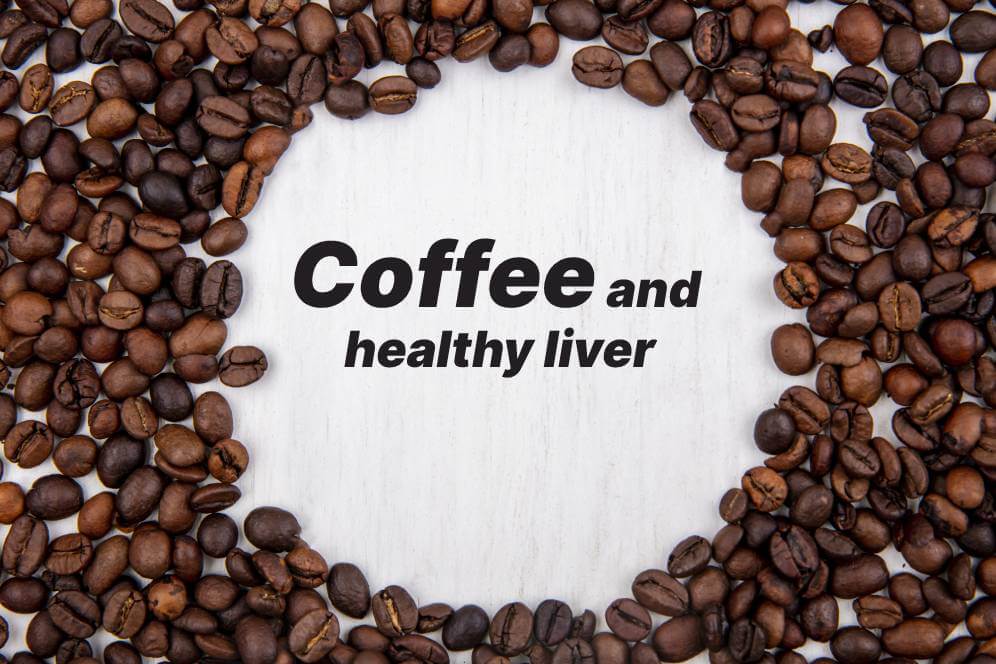Coffee and Liver; Beneficial or harmful? What kind of coffee is good for the liver?

Every kind of beverage has made its way into people’s daily lives in today’s contemporary society, and one of these beverages is coffee.
Drinking coffee has earned a particular place in the hearts and minds of many people today. It might even be argued that most individuals of all ages prefer drinking coffee throughout the daytime hours.
Many advantages come from drinking coffee, the most notable of which contains caffeine.
Because caffeine may supply a person with daily energy, most people drink coffee first thing in the morning to kick off an active day.
On the other hand, it has its drawbacks, just like any other coffee beverage, and they must be considered while deciding whether to consume it.
We want to discuss the consequences of coffee consumption on the liver.
If you are a coffee enthusiast, it is recommended that you read this article to learn more about the effects that this beverage may have on your liver and whether or not drinking coffee is beneficial to your kidneys.
So, if you’re ready to proceed, click here.
Our Conclusion: Coffee is not a miraculous cure. It cannot completely reverse liver disease or compensate for the damage caused by excessive alcohol consumption. However, it can be a delightful and satisfying step towards having a happier liver.
Contents
- 1 Coffee and liver
- 2 Coffee drinking and fatty liver disease
- 3 Is decaffeinated coffee beneficial to your liver?
- 4 Coffee and healthy liver: Recommendations
- 5 Caffeine in Non-Alcoholic Fatty Liver Disease
- 6 Caffeine in Liver Cirrhosis
- 7 Can excessive coffee consumption increase liver enzymes?
- 8 Coffee Recommendations for Liver Health
- 9 Does coffee affect liver blood tests?
- 10 FAQS relate to the coffee and liver
Coffee and liver
As we said in the opening, most individuals begin drinking coffee in the morning to eliminate the caffeine withdrawal symptoms associated with the morning cup of coffee and alleviate the boredom associated with the lunch hour.
However, there are several additional benefits of drinking coffee; the most important is health!
According to the primary goal of this post, we discovered that coffee has beneficial effects on the liver after doing several studies and conducting a study by research.
However, the issue remains as to the relationship between your coffee and your liver.
Let’s continue reading.
According to several scientific studies, individuals who consume coffee daily may be less likely to be exposed to chronic liver diseases. In the case of non-alcoholic fatty liver disease, coffee can have a beneficial effect on the disease process and reduce the risk of detrimental outcomes such as liver cancer.
Coffee drinking and fatty liver disease
We all know that coffee is one of the most widely consumed beverages. Because of this beverage’s popularity and widespread use, academics have begun to consider researching and conducting studies in this area. Overall, these results are encouraging for the health of the liver.
Coffee is particularly beneficial in treating non-alcoholic fatty liver disease.
A non-alcoholic fatty liver disease condition occurs when excess fat is collected in the liver cells.
It is more common in people who are overweight, have diabetes, or have high cholesterol, and over time, it can lead to cirrhosis or ulcers of the liver. In the future, liver cancer or liver failure is not uncommon.
What is the good news at this point? According to research, consuming too much coffee may lower the chance of contracting an illness.
One other evidence is that coffee is beneficial to persons who have hepatitis C.
Regular coffee consumption lowers the chance of developing cirrhosis in patients who have previously suffered from non-alcoholic fatty liver disease and continue to suffer from it.
Additionally, patients with cirrhosis who consume more coffee are less likely to die due to the condition.
Is decaffeinated coffee beneficial to your liver?
As for decaffeinated coffee, it’s a complete waste of time. If we want to get the advantages of coffee on the liver, we must drink ordinary coffee – not decaffeinated – daily, rather than decaf.
There is something beneficial to the liver in caffeine that cannot be overlooked.
Other advantages of coffee for the liver and other organs, in general, include the presence of antioxidants and other substances, all of which play a significant role in lowering liver inflammation and other symptoms.
You should turn to caffeine-containing coffee. Many of the positive effects of coffee on the liver are due to its high caffeine content. You should drink regular coffee – without caffeine – daily to benefit from its advantages for the liver. There’s something about caffeine that is beneficial for the liver.
There are other beneficial substances as well. Coffee contains antioxidants and other compounds, all of which play a crucial role in reducing liver inflammation.
Coffee and healthy liver: Recommendations
When drinking coffee, the essential thing to remember is to drink just the recommended quantity.
The most recommended quantity of coffee consumption is:
- Three cups each day to avoid liver problems.
- Four, five, or even six cups of coffee each day may be beneficial in the case of hepatitis.
- Patients suffering from fatty liver disease should drink around 5 to 6 cups of coffee every day.
Concerns have been raised about the level of consumption indicated, though. Some individuals have headaches, problems falling asleep, anxiety, and rage.
Coffee consumption might be hazardous if you have an irregular heartbeat or other cardiovascular conditions.
Coffee might be a dangerous beverage to consume for persons with lung cancer. You must advise your doctor before drinking coffee or adding it to your daily routine if you have any disorders listed above.
If you do not have any physical difficulties and your coffee intake is not hazardous to you, you should refrain from drinking your coffee with cream and sugar.
Given the high prevalence of diabetes and obesity among patients suffering from fatty liver disease, it is crucial not to oversweetness your coffee by adding additional fat and sugar.
It should be noted that pure black coffee is the best. If you cannot drink it black, artificial sweeteners can be substituted for sugar. Alternatively, skim milk or vegetable milk may be used for cream.
Caffeine in Non-Alcoholic Fatty Liver Disease
Non-alcoholic fatty liver disease (NAFLD) is a common liver condition that has widely spread in the human population. This disease typically arises due to the accumulation of fat in liver cells and, in some cases, can lead to more serious complications. One of the issues that has garnered attention is whether caffeine consumption is harmful to individuals with NAFLD.
Caffeine is a chemical substance found in coffee, tea, energy drinks, and many other beverages and consumable products. Initial research suggests that moderate caffeine consumption may help reduce the risk of developing non-alcoholic fatty liver disease.
While caffeine can be beneficial, excessive consumption of it may diminish its positive effects and even lead to more severe liver problems.
Caffeine in Liver Cirrhosis
One of the advantages of caffeine in individuals with liver cirrhosis is its ability to enhance insulin sensitivity. Studies have shown that caffeine can assist in improving insulin sensitivity, resulting in lower blood sugar levels. This can be beneficial for individuals who have both type 2 diabetes and cirrhosis simultaneously.
Liver cirrhosis is usually accompanied by fatigue and decreased energy levels. Caffeine, as a natural stimulant, can motivate individuals and boost their energy, potentially improving the quality of life for those with liver cirrhosis.
Can excessive coffee consumption increase liver enzymes?
Coffee reduces the risk of non-alcoholic fatty liver disease. However, research indicates that individuals who consume a large amount of coffee are less likely to be exposed to non-alcoholic fatty liver disease.
It also appears that coffee protects individuals with liver problems. There is evidence that coffee is beneficial for individuals with hepatitis C, a virus that infects the liver and can lead to cirrhosis and liver cancer.
In individuals with non-alcoholic fatty liver disease, regular coffee consumption reduces the likelihood of developing cirrhosis. Individuals with cirrhosis who drink more coffee are less likely to lose their lives due to this disease.
Coffee Recommendations for Liver Health
To prevent liver problems, we recommend at least three cups a day. And if you have hepatitis or fatty liver disease, even four, five, or even six cups a day can help.
However, not everyone can drink so much coffee without side effects. In some individuals, this consumption can lead to headaches, trouble sleeping, anxiety, and nervousness. Therefore, it is recommended to drink coffee only as much as you can tolerate.
Note: If you have irregular heartbeats or other heart problems, excessive coffee consumption can also be risky. In the case of lung cancer, coffee can also create issues. In such cases, you should avoid coffee until you consult with your physician for guidance.
In the final analysis…
As a result of the above, it can be concluded that drinking coffee is the sole method to preserve liver health and that there are several ways to improve liver health.
It is also crucial to remember that although coffee might be beneficial to the function and wellness of the body, it is not a miracle worker.
Despite popular belief, it is not possible to cure liver disease or undo the damage caused by heavy alcohol usage. However, it may be a beneficial and rewarding step in the direction of a healthy liver.
Does coffee affect liver blood tests?
Yes, coffee consumption can potentially impact liver blood tests. Research has shown that the caffeine present in coffee can temporarily elevate the levels of liver enzymes. Specifically, tests related to enzymes ALT (alanine aminotransferase) and AST (aspartate aminotransferase) are often affected.
For this reason, if you have recently consumed coffee and are undergoing liver blood tests, inform your doctor. They may decide to postpone the tests or interpret the results taking your coffee consumption into account. For more accurate results, it’s advisable to reduce coffee consumption for 24 to 48 hours before liver blood tests.
FAQS relate to the coffee and liver
Is it OK to consume coffee if I have liver problems?
It is possible that drinking coffee can assist ease liver issues if you have been experiencing them for some time. Researchers have discovered that consuming between 1 to 3 cups of coffee each day can help in reducing the symptoms of liver cirrhosis.
Do you know whether coffee is bad for your liver?
People who suffer from liver illness may eventually develop cirrhosis or ulcers due to their condition. Over time, this ulcer may progress to the point of causing liver cancer or liver failure. However, according to studies, persons who consume large amounts of coffee are less likely to develop non-alcoholic fatty liver disease.
Is it possible to cure liver damage with coffee?
More precise data reveals that coffee consumption is related to a lower incidence of liver cirrhosis than previously thought. According to less accurate information, coffee could completely “reverse” liver damage, or it may even worsen it.
Is coffee with cream beneficial or detrimental to the liver?
Everyone should begin eating a balanced diet to maintain a healthy liver. Coffee consumed with cream and sugar may hurt the health advantages of the beverage; thus, this beverage should be used in moderation, and it is even better to drink coffee and black! Coffee has the potential to be a valuable tool in keeping a healthy liver.





